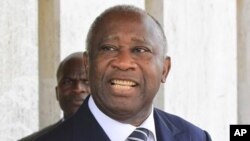Ivory Coast's incumbent president is expelling the British and Canadian ambassadors after their countries withdrew recognition of his envoys. International pressure on the incumbent president is growing as the Obama administration has frozen his assets.
Incumbent government spokesman Ahoua Don Mello says Canadian ambassador Marie Isabelle Massip and United Kingdom ambassador Nicholas James Westcott are no longer welcome in Ivory Coast.
In an announcement on state-run television, the spokesman said the ambassadors are no longer recognized by the government of incumbent president Laurent Gbagbo through principles of reciprocity concerning diplomatic relations after the Canadian and British governments announced they would no longer recognize Gbagbo emissaries.
The European Union, the Economic Community of West African States, the African Union, and the United States say Mr. Gbagbo should hand over power to the internationally-recognized winner of November's vote, former prime minister Alassane Ouattara.
The U.S. Treasury Department is banning U.S. citizens from business deals with Mr. Gbagbo, his wife Simone, and three top aides including foreign minister Alcide Djedje. All of their assets within U.S. jurisdiction are now frozen.
In a written statement, the director of the U.S. Treasury Department's Office of Foreign Assets Control says Mr. Gbagbo continues to demonstrate wanton disregard for the will and well-being of his people. Adam Szubin says the ban will isolate Mr. Gbagbo from the financial system and underscores the desire of the international community that he step down.
Mr. Gbagbo appears to have no intention of leaving office, saying he won re-election because the constitutional council annulled as fraudulent nearly ten percent of all ballots cast. Mr. Gbagbo chaired his first cabinet meeting of the year Thursday, focusing on security and the economy.
Mr. Ouattara meanwhile remained secluded at an Abidjan resort hotel where he is guarded by U.N. peacekeepers. The head of that force wants the Security Council to send as many as 2,000 additional troops to Ivory Coast in the next few weeks to help resolve this political crisis.
But Mr. Gbagbo says all of the nearly 10,000 U.N. peacekeepers who are already here must leave because they have lost the confidence of civilians.
Foreign minister Djedje says peacekeepers are interfering in Ivory Coast's internal affairs.
Djedje says the United Nations mission in Ivory Coast has deviated from its original role and is now acting in complicity with rebels. Djedje says the Gbagbo government can not accept that and no longer trusts U.N. peacekeepers, so they must leave.
The spokesman for the United Nations mission in Ivory Coast says 210 people have been killed since the disputed election, including 14 deaths this week in a western province that the U.N. says are not necessarily a direct result of the ongoing political crisis.
Mr. Ouattara says he still believes the situation can be resolved peacefully.
Mr. Ouattara told U.N. radio here that the results of the election were clear and were certified by the United Nations. Laurent Gbagbo lost the vote, and Mr. Ouattara says his claim to the presidency based on a ruling by the constitutional council is without merit.
Incumbent Ivory Coast President Expels British, Canadian Ambassadors




